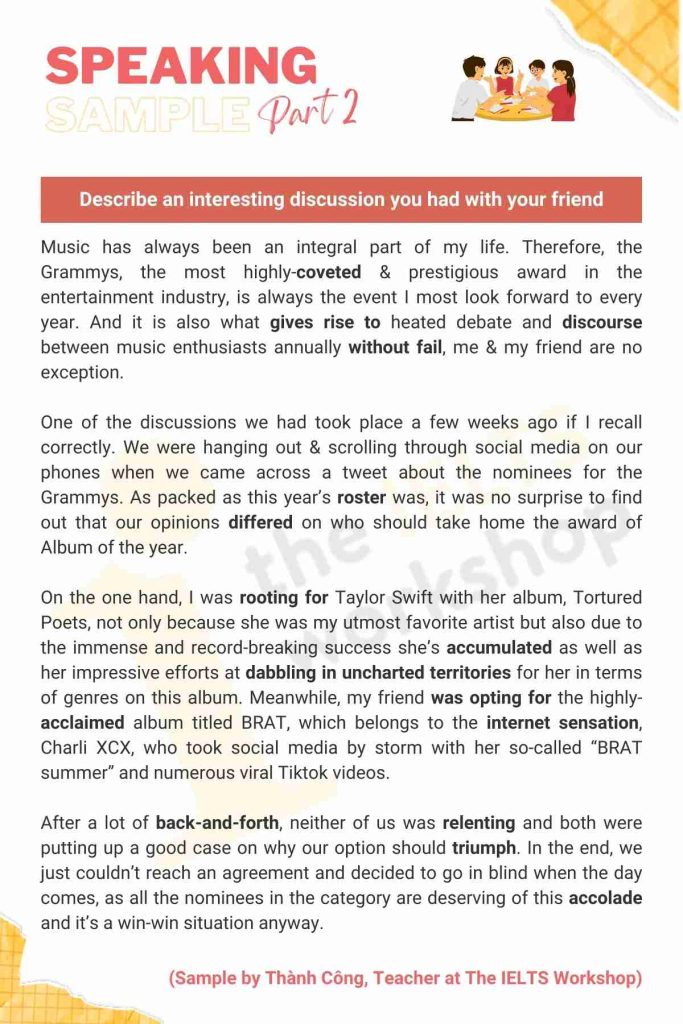Trong chuyên mục giải đề IELTS Speaking kỳ này, cùng tham khảo chủ đề: “Describe an interesting discussion you had with your friend” qua bài mẫu của thầy Thành Công và cô Hồng Linh của The IELTS Workshop dưới đây nhé.
Part 2: Describe an interesting discussion you had with your friend
Describe an interesting discussion you had with your friend
You should say:
What the discussion was about
What opinions you and your friend had
Why you think the discussion was interesting
And how you felt about it
Dưới đây là bài mẫu cho topic “Describe an interesting discussion you had with your friend”.
1. Bài mẫu (Sample)
Sample 1:

Sample 2:

2. Từ vựng (Vocabulary)
Sample 1:
- coveted (adj) được thèm muốn
- to give rise to (v): gây ra
- discourse (n): cuộc tranh luận
- without fail (adv): luôn luôn
- roster (n): danh sách
- to differ (v): khác nhau
- to root for (v): cổ vũ
- to accumulate (v): tích luỹ
- to dabble in (v): thử sức
- uncharted territory (n): lãnh thổ chưa được khai phá
- to opt for (v): lựa chọn
- acclaimed (adj): được đánh giá cao
- internet sensation (n): hiện tượng mạng
- back-and-forth (n): tranh cãi qua lại
- to relent (v): dịu đi, chịu thua
- to triumph (v): vô địch, chiến thắng
- accolade (n): giải thưởng
Part 3
Why do some young people refuse to communicate with others?
Should parents consider their children’s opinions on everything? Why?
In what industries do you think communication is a necessary skill?
Should parents require their kids to obey them?
Do children have strong opinions?
When do children normally form their own views?
1. Why do some young people refuse to communicate with others?
Sample 1: There are many factors that could be attributable for this aversion towards communication among youngsters, but I believe the most common denominator would have to be their over-reliance on technology, especially social media. In fact, the youth prefer conversing online exclusively as it’s much more convenient and less nerve-racking by means of memes, emojis or internet slangs. Meanwhile, in real life, they are more reticent and withdrawn because they struggle to find things to fill the awkward silence.
- aversion (n): ác cảm
- by means of (prep): bằng cách, nhờ vào
- reticent/withdrawn (adj): dè dặt, kín tiếng
Sample 2: There are several reasons why some youngsters might not enjoy talking and sharing with others. First, they may lack confidence and feel shy or insecure about expressing themselves and voicing their views, as they fear being judged or misunderstood. Secondly, many people are just naturally introverted, you know, they hate chatting with others and enjoy spending time on their own, considering their thoughts and decisions. Lastly, I guess it’s worth mentioning emotional struggles here as issues like anxiety, depression, or stress can cause young people to withdraw and avoid communication, even with their close friends or family members.
2. Should parents consider their children’s opinions on everything? Why?
Sample 1: It depends. On the one hand, children are in no position to give their opinions on matters simply due to their lack of life experience and insights, which could lead to them making wrong choices or offering ill-advised suggestions. On the other hand, parents allowing their offsprings to chime in every now and then could provide them with valuable learning experience. And in turn, this trial run could come in handy later on once they enter the labor market where they will be required to put forward their perspectives to help resolve issues regularly.
- ill-advised (adj): không tốt, không khuyến nghị
- to chime in (v): góp lời
Sample 2: Once again, I’m not sure as I have never thought about it before, but based on my experience during childhood, I would have appreciated it if my parents had asked for my opinions more, so maybe the answer is yes. I mean children may feel happy and grateful when parents listen to and take their views more seriously. Of course, children have no expertise or experience in many fields, like finances, health and safety or law, but this can be a chance for parents to guide and educate their children on these fields and develop their critical thinking.
3. In what industries do you think communication is a necessary skill?
Sample 1: In my opinion, a certain level of communication is required in nearly every profession. That is due to the fact that in order for a company to thrive, all of its departments need to be able to work together and coordinate with one another, which could only be accomplished via continuous exchange of information and communication. Therefore, I’d contend that regardless of the field you work in, honing your interpersonal skill is a must.
- to thrive (v): phát triển
- to hone (v): trau dồi, mài dũa
Sample 2: Well, all fields require us to have good communication skills these days. Because of the higher level of complexity of tasks at work, people now need to cooperate in teams to be more productive and effective. They have to share their opinions and ideas to develop projects, assign tasks and consult their seniors. On top of that, when problems arise, they have to talk in a calm manner to solve them too.
4. Should parents require their kids to obey them?
Sample 1: From what I’ve witnessed, it is very common for parents to want to instil in their children a sense of obedience from a very young age and I believe this is necessary but to an extent. To be specific, teaching kids how to adhere to orders at home early on could help familiarize them with the chain of command that they may encounter in a professional setting in the future. However, some parents are overly stringent, which may cause their children to resent them and rebel should their control become unbearable. As a result, even though compliance is a good virtue to teach, parents should also provide their offsprings with some leeway once in a while.
- obedience/compliance (n): sự tuân thủ, nghe lời
- to instil something in someone (v): làm cho thấm nhuần
- to adhere to (v): tuân theo
- chain of command (n): chuỗi chỉ huy, cấp bậc điều hành
- stringent (adj): nghiêm khắc
- to resent (v): ghét
- to rebel (v): nổi loạn
- leeway (n): sự nhân nhượng, sự tự do
Sample 2: This is a complex question, and opinions may vary depending on cultural values and parenting styles. On the one hand, in many Asian countries like Vietnam, it’s true that parents expect their kids to listen to and follow whatever moms and dads say, especially when it comes to rules that keep children safe and help them differentiate between right and wrong. Some parents might also be extremely strict to make sure their kids would never experience any failure or danger as well. However, I believe that in other countries, like the USA, they have a more flexible approach and consider that blind obedience is not always beneficial. Children are encouraged to voice their views and communicate openly with their parents, and sometimes parents even ask for children’s thoughts on some important issues like what schools to attend or where to live. This helps children to develop decision-making skills.
5. Do children have strong opinions?
Sample 1: I’d say that it varies from child to child. On the one hand, some children are more outspoken and opinionated. This could stem from their intrinsic characteristics or the manner by which their parents brought them up since childhood. On the other hand, other youngsters could be more reserved. Therefore, they prefer to keep their opinions to themselves or would easily subscribe to other people’s views instead because they don’t have any of their own.
- outspoken (adj): thẳng thắn
- opinionated (adj): nhiều định kiến
- to subscribe to (v): nghe theo (1 luồng ý kiến, quan điểm)
Sample 2: Honestly speaking, this matter beats me, I have no idea simply because I have never thought about giving birth to any child, and also have never paid attention to any kid’s behaviour. Maybe yes as I have seen some kids being extremely opinionated when they creamed their heads off in an ice-cream parlour so that their parents would buy them some more ice-cream. I’m pretty sure that it shows how firm children can be about their needs and wants, but it often freaks me out.
6. When do children normally form their own views?
Sample 1: To be honest, it’s quite hard to pinpoint a specific point in time for it to happen, but if I were to hazard a guess, I’d say that as soon as they step foot into primary school, they’ll begin to formulate their own perspectives. This is due to a variety of reasons, chief of which is because teachers usually teach students to think independently or they would hand out assignments which encourage students to utilize their critical thinking skills. Additionally, schools are where children will be surrounded by many of their peers coming from different backgrounds, which is conducive to them gaining more insight and life experience to formulate their own view on life.
- conducive (adj): có ích cho, dẫn đến (cái gì)
Sample 2: At around the age of 6 or 7, I guess, but this process becomes more noticeable and developed during their early teenage years, when they’re around 12 to 14. I mean before that, when they’re 3 or 4 years old, they usually just listen to what their parents tell them and try to obtain as much knowledge as they can, and then when they start academic education, when they attend primary school, they can question what they have learnt and have their own perspectives on issues around them. After that, with suitable parenting style, education, media exposure and peer influence, their opinions might be developed even more so that they can become more independent in their thinking when they are teenagers.
Ngoài ra, khoá học Senior của The IELTS Workshop sẽ giúp bạn nâng cao kỹ năng cũng như xây dựng chiến lược trả lời câu hỏi, tham khảo ngay nhé!!









